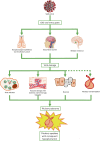COVID-19 and hypopituitarism
- PMID: 34387832
- PMCID: PMC8363093
- DOI: 10.1007/s11154-021-09672-y
COVID-19 and hypopituitarism
Abstract
Besides the pulmonary manifestations caused by severe acute respiratory syndrome (SARS) coronavirus 2 (SARS-CoV-2), an emerging endocrine phenotype, which can heavily impact on the severity of the syndrome, has been recently associated with coronavirus disease 2019 (COVID-19). Patients with pituitary diseases or the pituitary gland itself may also be involved in COVID-19 clinical presentation and/or severity, causing pituitary apoplexy.Moreover, hypopituitarism is frequently burdened by several metabolic complications, including arterial hypertension, hyperglycemia, obesity and vertebral fractures, which have all been associated with poor outcomes and increased mortality in patients infected by SARS-CoV-2.This review will discuss hypopituitarism as a condition that might have a bidirectional relationship with COVID-19 due to the frequent presence of metabolic comorbidities, to the direct or indirect pituitary damage or being per se a potential risk factor for COVID-19. Finally, we will address the current recommendations for the clinical management of vaccines in patients with hypopituitarism and adrenal insufficiency.
Keywords: COVID-19; Hypopituitarism; Pituitary surgery; SARS-CoV-2; Vaccination.
© 2021. The Author(s), under exclusive licence to Springer Science+Business Media, LLC, part of Springer Nature.
Conflict of interest statement
Authors declare no conflicts of interest.
Figures



References
-
- Gupta A, Madhavan MV, Sehgal K, Nair N, Mahajan S, Sehrawat TS, Bikdeli B, Ahluwalia N, Ausiello JC, Wan EY, Freedberg DE, Kirtane AJ, Parikh SA, Maurer MS, Nordvig AS, Accili D, Bathon JM, Mohan S, Bauer KA, Leon MB, Krumholz HM, Uriel N, Mehra MR, Elkind MSV, Stone GW, Schwartz A, Ho DD, Bilezikian JP, Landry DW. Extrapulmonary manifestations of COVID-19. Nat Med. 2020;26(7):1017–1032. doi: 10.1038/s41591-020-0968-3. - DOI - PMC - PubMed
Publication types
MeSH terms
LinkOut - more resources
Full Text Sources
Medical
Miscellaneous

